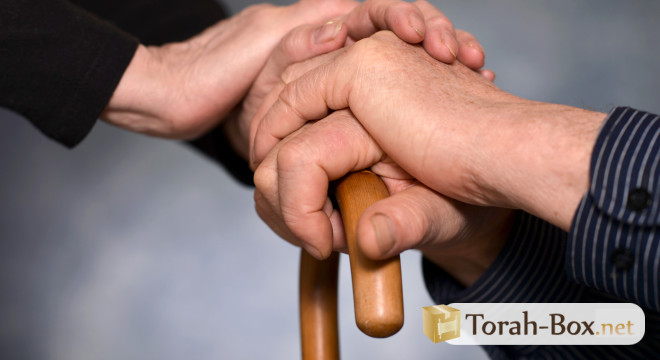
Honoring Parents
The Honor Due to Parents
We live in a very future-oriented society. Because of the technological and scientific advances of our time, the lifestyles of prior decades are perceived as old-fashioned and unappealing. Even though the Torah acknowledges and embraces the new opportunities offered by these technological advances, it nevertheless insists on the crucial importance of considering past with deep respect.
From this perspective, a “Torah Jew” does not conceive any contempt for his forefathers, considering them as “retrograde”, instead he understands that he has much to learn from them.
This vision of the world is what underlies, among other things, the prescription of honoring our parents and grandparents, as well as the elderly. Still, one may ask: “What makes our parents so special that we have to honor them?”
Judaism teaches us that the gift of Torah at Mount Sinai constituted a central moment in world history. This event was of paramount importance: the world was exposed for the first time to the ultimate source of wisdom, that is the Torah. The generation that directly experienced this revelation is called the “generation of wisdom” – the first generation exposed to the Torah.
Since that time, oral and written Torah has been transmitted from father to son through a chain that goes back to Sinai. As a result, throughout history, each generation moves away from the giving of the Torah. As a result, the youngest are expected to see their parents as the closest to the starting point of the Sinai chain of wisdom and honor them accordingly.
There is another reason why the Torah insists on the respect due to parents: the Torah gives great value to life experience. At a time when novelty is fashionable (as indicated for example by the victory of Barack Obama in the Democratic primaries), the value of experience happens to be minimized.
And yet, one learns invaluable lessons in life is going through different experiences and facing life’s ups and downs, Some may tend to reject their parents, viewing them as retrograde and far from being a source of wisdom! But if we happened to change our outlook on our parents, we would learn a lot from them.
One of the great Rishonim[1] mentions, in the Sefer Hachinuch, another reason for this commandment. He writes: “It is proper for a person to recognize and give kindness to someone who did a favor to him, and shouldn’t be an ingrate and a denier of good… and he should put into his heart that his father and mother are the reason for his being in this world, and therefore in truth he should really do for them all honor and purpose that he could, because they brought him into the world, and also put many efforts into him when he was little.”[2]
As we explained in the past, one of the key functions of the commandments is to lead man to progress and improve his character traits. The Sefer Hachinuch teaches us that the Mitzvah of honoring parents helps man to develop an essential character trait, that is gratitude. It is very easy to get used to receiving from others to the point of acting as if we deserve it – which is one of the reasons for ingratitude.
The people to whom we owe most gratitude are undoubtedly our parents, as it would be impossible to enumerate the number of acts of kindness they performed for us throughout our lives. As outlined in the Sefer Hachinuch, the kindness they showed us when we were very young is in itself a sufficient reason to express them profound gratitude. We came to the world without defense, and our parents endured outstanding self-sacrifice in order to feed us, clothe us and take care of our education.
We can argue that actually, our parents are not so admirable – they may have been critical or forced us to adopt a way of life we did not want to follow. Here are two possible answers to this argument:
- Although there may be some truth in these grievances, still the obligation to show gratitude for the countless good things they have done for us remains.
- The main reason we must honor and respect our parents is that they gave us the most beautiful gift, namely life. Even though we feel they have not been good parents, we owe them a huge debt of gratitude for them giving us the chance to experience life.
The Mitzvah of honoring our parents is a key tool to help us become more grateful. By the way, a good exercise to develop our gratitude consists of listing some of the benefits we have received from them.
[1] The Rishonim refers to “the first commentators”. The Rishonim lived between the years 900 and 1500 before the common era.
[2] Sefer Hachinuch Mitzvah 33.
Torah-Box.net Account
To access the entire Torah-Box.net website, sign up for free in less than a minute.
Weekly Parsha
 Candle Lighting - New York
Candle Lighting - New York
Friday December 26th, 2025 at 16:16 *Shabbat ends at 17:22 *
change my location
* Times given as an indication, check the times of your community









